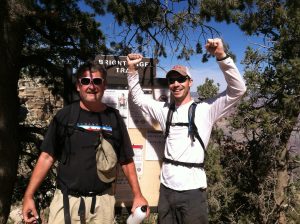Archive for September, 2016
Learning to succeed despite trials
 The New Testament book of James says “Count it all joy when you encounter various trials.” It goes on to say that the testing of your faith produces endurance.
The New Testament book of James says “Count it all joy when you encounter various trials.” It goes on to say that the testing of your faith produces endurance.
I’ll confess that I’m not always joyful in the midst of trials and tribulations, whether business or personal, but I have learned the value of them.
The picture is my son Trey and me after hiking out the Bright Angel trail from the Colorado River in the Grand Canyon. A joyful, although for me, trying hike. But well worth the reward once accomplished.
Einstein flunked out of school, failed his college entrance exam, and was told he lacked the mental abilities to be a physicist. Thomas Edison was considered “slow” by his teachers, and failed thousands of times before coming up with the electric light bulb.
Harlan Sanders, of KFC fame, had a failed restaurant and was rejected over one thousand times when trying to get a franchise going. He eventually did succeed, and built a successful restaurant chain.
The annals of business are replete with such stories, in fact, it’s more the norm than you might think. Bill Gates had a failed company that was trying to sell compiled traffic data before founding Microsoft.
The trick is to learn from your failures.
In my career, I learned much more from my failures than I ever did from success. It’s just how we’re wired.
John Maxwell wrote “Failing Forward” and he lists seven principles for learning from failure.
- Reject Rejection: Do not allow your self worth to be determined by external events. Believe in yourself.
- Don’t Point Fingers: Blaming others for your failures is a sure fire way to fail backwards and learn nothing from the experience. If I am the problem, then I am the solution.
- See Failure as Temporary: You can either wallow in failure, or you can see it in perspective as a temporary setback.
- Set Realistic Expectations: Unrealistic goals doom people to failure.
- Focus on Strengths: It’s very tempting to concentrate on your weaknesses. But, it’s much better to focus and build on your strengths.
- Vary your approaches to achievement: Bill Gates, Steve Jobs, Harlan Sanders, and a number of other successful people did not achieve great success in their first ventures. Don’t put yourself in too small a box.
- Bounce Back: When dealing with failures, successful people have short memories. It’s fine to rehash and learn from failure, but it’s not fine to dwell on it. Look forward.
Eddie
More sales discussion
 We all enjoy buying, but we do not want to be sold. I was recently in a music store looking at some guitar accessories. The salesperson walked over and said “may I help you?” And I said, (just like you do).. “no thanks.. just looking.”
We all enjoy buying, but we do not want to be sold. I was recently in a music store looking at some guitar accessories. The salesperson walked over and said “may I help you?” And I said, (just like you do).. “no thanks.. just looking.”
That’s despite the fact that I went in there to buy a guitar accessory. Why did I say that? Because, just like you, I don’t like being sold anything.
In Mark Twain’s Huckleberry Finn after the townspeople figure out they’ve been conned by Huck and Jim’s unwanted raft partners, they begin yelling “sold, we’ve been sold!” That’s the same connotation we give to that word today. And no one likes it.
But, every successful business needs to “sell” their products and services, right?
Peter Bourke wrote “Unselling: Sell Less and Win More” It’s a great book that I had our people read. Peter, along with most other successful sales people and sales trainers contend that the first thing you should attempt with a prospect is NOT to sell him anything, but instead to offer him value. In short, make it about him, and not about you.
Often, even with the best of intentions, we fail at this simply because we don’t know what the prospect or customer really values. It’s very easy to assume we do; and it’s a deadly mistake.
In the early days of our business, I was very proud of my own technical prowess in our field. At the risk of sounding arrogant, I was very proficient in the electronic motor drive world, and enjoyed a national reputation as a result. And, it was unquestionably an advantage.
However, I was often distressed when a competitor I felt was technically inferior would steal a customer or land an account I was chasing. “How could that prospect give the business to them, when I’m so much better?”
Over time, I came to understand that what I valued most, was not necessarily valued by prospects. They expected a certain level of expertise, in fact, it was sort of the ticket to the game. When I repaired equipment and it worked they were happy, but they also expected it. When my competitor repaired it, and it worked, they were also happy. Arguing technical nuances was not interesting to the customer, even though it was paramount with me.
We must learn what the customer values before we can be of value. Bourke makes the very valid point that there are times when what the prospect values or wants is not in his best interest, and we can offer the value of educating him. But regardless, the starting point in that discussion is to learn what’s important to him now. Then by acting on what you learn, you can become a resource instead of salesperson.
How do you discover what’s important? Well, start by listening. Learning what a customer or prospect values is impossible with your mouth open. Customers care about their business, not about yours. The more you learn to care about their business, the better relationship you can build with them.
Jeffrey Gitomer says if you lose a job to an existing customer to a competitor, it simply means that competitor has a better relationship with that customer than you do. That’s a hard pill to swallow for many of us, but like most medicine, it does us good.
Here’s a few thoughts for you to consider:
- Why do people buy from you? Don’t hurry through this, take the time to analyze.
- Why do they buy from your competition?
- What’s your specific market advantage? This is something very important to your customers, that you excel at.
- How many more people would buy from you IF ONLY they knew you existed?
How strongly do you believe in your product or service? At our electronic motor drive company EMA Inc. we say that “No One, Anywhere, is Better at Drives than we are.” I firmly believe that, and I often ask our team member if they do. Often when we make mistakes, we will start by saying, “we must fix this in order to remain better at drives than anyone else.” It’s part of our culture.
This isn’t something you can just say and then leave alone, it means that every day we have to inject energy and passion into what we do, and be certain that we are in fact as good as we say.
But here’s what it does for you in sales… It gives you a belief that cannot be penetrated about the value you can bring to a prospect. We firmly believe that in our niche market, prospects get more value in doing business with us than with anyone else in our field.
And that makes selling and doing business a lot more rewarding. As Peter Bourke says.. sell less and win more.
Eddie Mayfield




